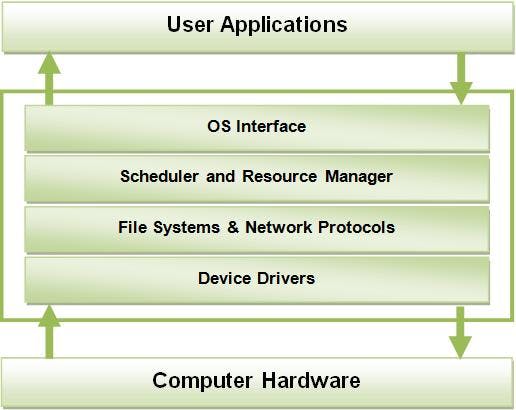OS is the abbreviation of Operating System. The operating system is a system software that manages everything that goes in the computer. It reads, writes, and deletes files from the hard drive. It handles how the processes start, how they interact with each other, and how they eventually finish. Furthermore, it manages how memory gets allocated to different processes, how network packets are sent and received, and how each programming can access the different hardware components.
There are actually two main parts in an operating system: the kernel and the user space. The kernel is the main core of an operating system. It talks directly to our hardware and manages our systems resources. As users, we don't interact with the kernel directly. We interact with the other part of the operating system called the user space. The User space is basically everything outside the kernel. These are things that we interact with directly, like the system programs and user interface.

As you probably already know, there are a lot of different operating systems out there. The major operating systems using IT today are Windows, macOS, and Linux.
The Windows operating system is developed by Microsoft, and is widely used in the business and consumer space. Most PCs come with Windows as the default operating system.
macOS is developed by Apple and is mainly used in the consumer space. If you purchase any Apple computer, they'll come with macOS preloaded.
Linux is an open source operating system. Open source software is free to share, modify, and distribute. Score. Linux is used heavily in business infrastructure. Most servers in the world today are running Linux. It's also available in the consumer space, although less common. Linux itself is actually the name of the kernel originally developed by Linus Torvalds, also a total boss. Today, Linux has grown into a huge community effort, with developers all over the world contributing to its success. Because Linux is open source, a lot of different organizations package their own versions of it, unlike Windows or macOS, which are solely developed by their respective companies. We refer to these different flavors of Linux as distributions. Some common Linux distributions are; Arch Linux, Ubuntu, Debian, and Red Hat. Here's family tree and timeline of Linux distros: https://distrowatch.com/images/other/distro-family-tree.png
If you've heard of Chrome OS, you may know that it's another operating system based on a Linux kernel. But unlike other distributions, Chrome OS is usually considered an OS in its own right.
You may have also heard of Unix. Unix is an operating system developed back in the 70s by Bell Labs. After its original release, the OS went through a bunch of different versions, with different companies releasing variants of it. The fundamental ideas of how Linux works today are based on the Unix principles. A lot of the tools that we use to interact with the operating system are open source versions of those originally developed for Unix. This is why these tools in operating principles are us...
The macOS kernel and some of its user space are also based on a kernel and User space tools from the Unix family known as BSD. So, although the graphical interface is extremely different between the two, the command line is actually pretty similar.

